 Petzlover
Petzlover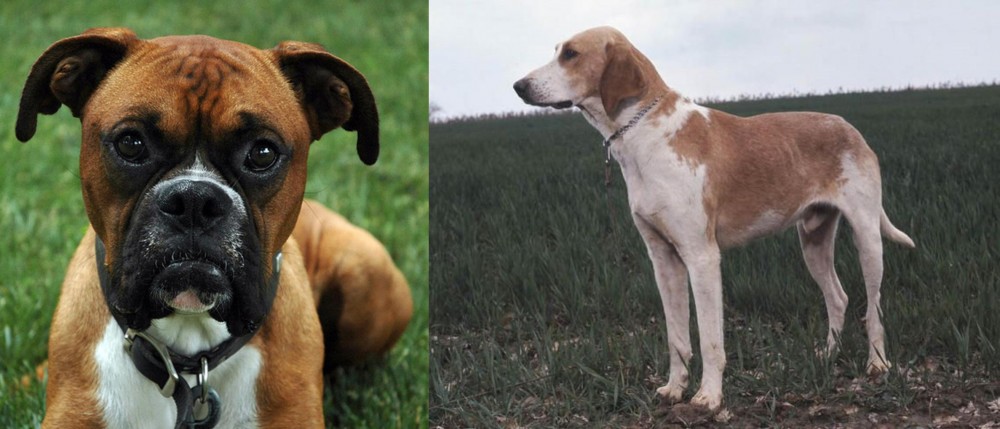 Boxer is originated from Germany but Grand Anglo-Francais Blanc et Orange is originated from France. Boxer may grow 7 cm / 2 inches shorter than Grand Anglo-Francais Blanc et Orange. Both Boxer and Grand Anglo-Francais Blanc et Orange are having almost same weight. Boxer may live 3 years more than Grand Anglo-Francais Blanc et Orange. Boxer may have more litter size than Grand Anglo-Francais Blanc et Orange. Both Boxer and Grand Anglo-Francais Blanc et Orange requires Low Maintenance.
Boxer is originated from Germany but Grand Anglo-Francais Blanc et Orange is originated from France. Boxer may grow 7 cm / 2 inches shorter than Grand Anglo-Francais Blanc et Orange. Both Boxer and Grand Anglo-Francais Blanc et Orange are having almost same weight. Boxer may live 3 years more than Grand Anglo-Francais Blanc et Orange. Boxer may have more litter size than Grand Anglo-Francais Blanc et Orange. Both Boxer and Grand Anglo-Francais Blanc et Orange requires Low Maintenance.
 In the late 19th century boxer was developed in Germany. It is a part of the Molosser dog group. The breed Brabanter Bullenbeisser is said to be the ancestor of the Boxer. He got the name Boxer as he stands with his back legs and does like a boxer do. In 1895 the breed came to a dog show by three germans named Friedrich Robert, Elard Konig and Hopner. In 1896 they founded the first boxer club as Deutscher Boxer Club. In 1902 the first Boxer breed standard was published by the club. The breed was introduced to United States in 20th century. The boxer involved in military work and also worked as a messenger dog. After 2nd world war they became popular as the soldiers brought them and introduced.
In the late 19th century boxer was developed in Germany. It is a part of the Molosser dog group. The breed Brabanter Bullenbeisser is said to be the ancestor of the Boxer. He got the name Boxer as he stands with his back legs and does like a boxer do. In 1895 the breed came to a dog show by three germans named Friedrich Robert, Elard Konig and Hopner. In 1896 they founded the first boxer club as Deutscher Boxer Club. In 1902 the first Boxer breed standard was published by the club. The breed was introduced to United States in 20th century. The boxer involved in military work and also worked as a messenger dog. After 2nd world war they became popular as the soldiers brought them and introduced.
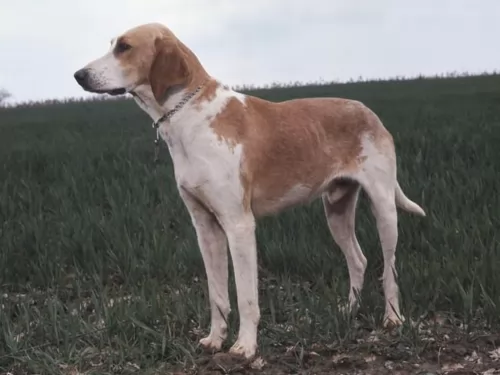 The Grand Anglo-Français Blanc et Orange is one of three Grand Anglo-Français breeds. The dogs comes from crossing French scenting hounds with English Foxhounds way back in the 19th century.
The Grand Anglo-Français Blanc et Orange is one of three Grand Anglo-Français breeds. The dogs comes from crossing French scenting hounds with English Foxhounds way back in the 19th century.
The sporting dog is rare, believing to be be pretty much confined to their country of origin – France. It is recognized in France by the French Kennel Club and also internationally by the Federation Cynologique Internationale. Since 2006, they have been recognized by the UKC and are thought to be kept essentially as a working dog as opposed to being kept as a companion dog.
 Boxer is a breed which is medium in size and has short hair. They have very strong jaws as to hunt large prey even hanging on biting them. It belongs to the working group. Boxers are well known for their love and faithfullness. Also he is very intelligent and its cleanliness makes him to be good dog for home. They are very energetic and are playful in nature. When boxers where trained by giving reward to them it is sure that they will perform its best. Normally they like to have good companionship with humans and smaller dogs.
Boxer is a breed which is medium in size and has short hair. They have very strong jaws as to hunt large prey even hanging on biting them. It belongs to the working group. Boxers are well known for their love and faithfullness. Also he is very intelligent and its cleanliness makes him to be good dog for home. They are very energetic and are playful in nature. When boxers where trained by giving reward to them it is sure that they will perform its best. Normally they like to have good companionship with humans and smaller dogs.
They are incredible in their alertness and well suitable for watchdog. Boxers will be playful and silly till 3 years as they will mature after that only. They require only a minimum amount of grooming. They are suitable for apartment living until they are with their owners. Boxer owners will be sure to enjoy its clownish behaviour. They will be excited many time and show that by spinning in circles and making a sound which the owner will understand that he is happy or he needs some thing which is in the hands of his owner.
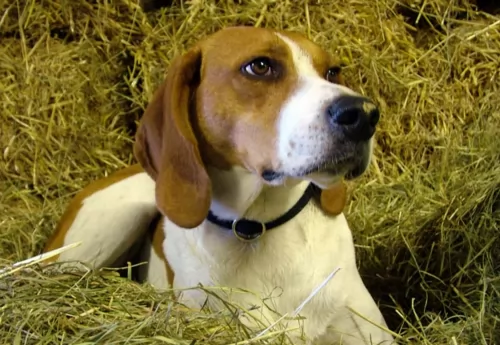 The lean, muscular Grand Anglo-Français Blanc et Orange is a large, powerful dog standing at 60 – 70cm at the withers and weighing 30 to 36 kg.
The lean, muscular Grand Anglo-Français Blanc et Orange is a large, powerful dog standing at 60 – 70cm at the withers and weighing 30 to 36 kg.
He has a short, broad head with a broad, flat skull. He has long legs, a long tail and long, floppy ears. His coat is white with orange markings. These dogs are instinctive hunters with a superb sense of smell and the ability to track their prey for miles.
Sociable, independent, loving and loyal, the Grand Anglo-Français Blanc et Orange can become attached to his owner. He doesn't want to be left alone for long periods of time, becoming bored and destructive.
Training and socialization is excellent for your dog, making him obedient and also more relaxed when you're not there.While he is patient and good with children, if you're looking for a playful pet, this dog wouldn't come as recommended for children, as his heart longs to just be outside on the hunt.
 They are good kid friendly dogs. He is famous for his alertness and thus a wonderful watchdog. He loves to play with children. The nature of dog varies according to the heredity and society. The temperaments of the parents will effect in the puppy. Boxer is a friendly companion and loves to be with its family all the time and play with them.
They are good kid friendly dogs. He is famous for his alertness and thus a wonderful watchdog. He loves to play with children. The nature of dog varies according to the heredity and society. The temperaments of the parents will effect in the puppy. Boxer is a friendly companion and loves to be with its family all the time and play with them.
Boxers are good for apartment living provided they are taken for a walk and exercised daily. It will be good if anyone stays with him always since he doesn't like being alone. He should be taken out only in a moderate weather as both hot and cold weather cannot be tolerated by him. He will suffer a lot in hot weather when compared with cold.
Training is necessary for them to refreshed physically and mentally. Boxer is a quick learner and rewarding them will make them more interested in doing it. Training should be started from basic commands like sit, stay and come. Boxer should be trained to not jump on visitors who come. They are very energetic and powerful and are eager to learn if properly taught.
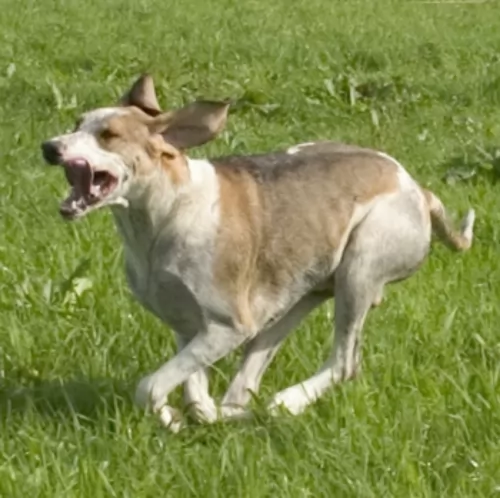 The Grand Anglo – Francais et Orange has always been a pack dog and used to being social. He will get on well with his entire human family as well as with any other pets in the home.
The Grand Anglo – Francais et Orange has always been a pack dog and used to being social. He will get on well with his entire human family as well as with any other pets in the home.
The Grand Anglo-Francais Blanc et Orange is a loyal dog, and when trained he becomes an excellent companion. He is patient with children, but doesn't make a particularly great playmate as he has a more serious personality.
The Grand Anglo-Francais Blanc et Orange is a dog that has been specifically developed to hunt, so ensure that he gets a good amount of exercise. While he is essentially a dog that loves working in a pack, he can still make his human family a loving and devoted pet.
 The major health problems Boxers get includes Cancer, heart problems such as Aortic stenosis, Gastric dilatation and intestinal problems. Infection is the major problem in puppies. Boxers are also in a risk of getting degenerative myelopathy which is a neurologic problem. Allergies and skin problems are also a problem in them. It is difficult to recognize a growing puppy to be free from all diseases and the only thing we can do is to buy the puppy from a reputable breeder.
The major health problems Boxers get includes Cancer, heart problems such as Aortic stenosis, Gastric dilatation and intestinal problems. Infection is the major problem in puppies. Boxers are also in a risk of getting degenerative myelopathy which is a neurologic problem. Allergies and skin problems are also a problem in them. It is difficult to recognize a growing puppy to be free from all diseases and the only thing we can do is to buy the puppy from a reputable breeder.
Boxers may lose their hair due to some diseases and conditions. When some materials such as nickel, rubber and wool are accidentally touched by them it may cause allergies and hairfall follows it. Some auto immune disorders leads to hairfall. Due to some inhalation of pollen or house dust the problem may happen. Some bacterial infection and hormonal problems may also leads to hairfall.
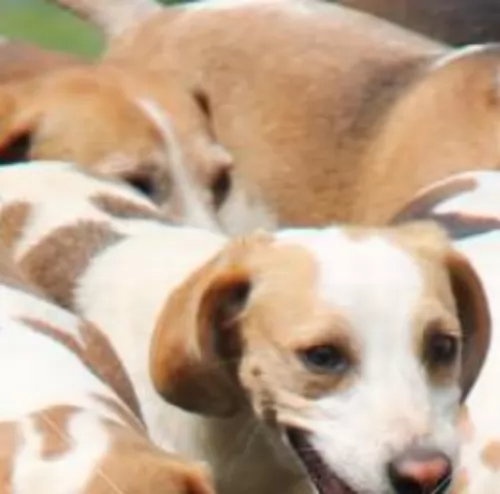 Capable of reaching 10 to 12 years in age, you won't really find any particular health issues with this dog. He is a fairly healthy dog and will be able to reach a good age with good nutrition, exercise, love and care.
Capable of reaching 10 to 12 years in age, you won't really find any particular health issues with this dog. He is a fairly healthy dog and will be able to reach a good age with good nutrition, exercise, love and care.
Because of the long, floppy ears, you want to be checking inside the ears. As a hunting scentdog, he will chase his prey through water if needs be, and damp ears can encourage bacteria.
Ear infections are common in most dogs, and you'll notice your pet scratching and rubbing at his ear and even shaking his head. You may also notice swelling or redness. Veterinary intervention will be necessary.
If your dog's ear infection has cleared up, you can maintain the health of the ear by cleaning them with a gentle cleanser and cotton wool. There is always caution when cleaning a dog’s ear, and rupturing the ear drum is one. Be careful, and if you're not sure, rather make an appointment with your vet to have his ears cleaned.
 Normally puppies require more food than adults to meet their energy requirement for growth. They should be fed in a correct time interval. The puppy food for large dogs must be chosen for their health. Boxer puppies must be fed twice in a day and two cups of food will be better for them for one time. Upto 6 months this method is recommended. Feeding them by dividing the meals into smaller portion will be good since they will eat too much and very fast. Weight of the puppy should be checked regularly and food should be given according to that.
Normally puppies require more food than adults to meet their energy requirement for growth. They should be fed in a correct time interval. The puppy food for large dogs must be chosen for their health. Boxer puppies must be fed twice in a day and two cups of food will be better for them for one time. Upto 6 months this method is recommended. Feeding them by dividing the meals into smaller portion will be good since they will eat too much and very fast. Weight of the puppy should be checked regularly and food should be given according to that.
The food given to the boxer will effect in the dog's health and its life span too. Also it should match our budget also. Overfeeding will make them overweight and thus bringing harm to them. It is recommended to feed boxer two times a day to avoid bloat. Food should be given such that the dog completely eats it and if they can't eat completely then the balance food must be thrown away to avoid over eating. They should not be given food while we eat even once as it will develop begging behaviour in them.
Boxers are not suitable for living in outdoors, since they have short coats and short noses. But they like to play in a fenced yard. It is recommended to make them walk for half an hour twice a day. Playing flyball with them will make them happy and making him exercised will give him a good behaviour.
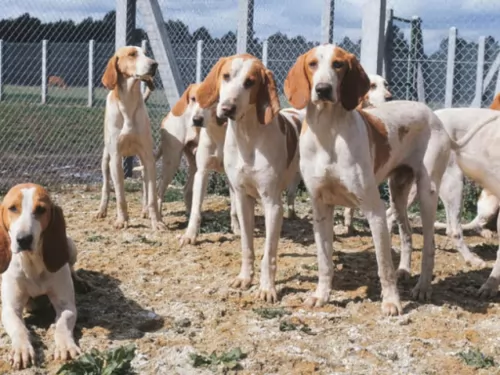 As a scenthound, your Grand Anglo-Français Blanc et Orange loves being outdoors and following a scent trail. These dogs therefore are better suited to life in the countryside as opposed to life in the city. Make sure you provide him with plenty of exercise – walks, swimming and running with you when you go cycling or jogging. Include ball- and rope games too.
As a scenthound, your Grand Anglo-Français Blanc et Orange loves being outdoors and following a scent trail. These dogs therefore are better suited to life in the countryside as opposed to life in the city. Make sure you provide him with plenty of exercise – walks, swimming and running with you when you go cycling or jogging. Include ball- and rope games too.
Your orange and white scent dog will thrive on you taking time out for him to brush his short coat twice a week and to also check for fleas and ticks at the same time.
Looking forward to his food, your energetic Grand Anglo-Français Blanc et Orange will require a high quality commercially manufactured food. Make sure that you buy the best brands to ensure your pet gets his vitamins and minerals in instead of just a lot of fillers, colorants and preservatives.
Many dog owners prefer giving their dogs several smaller meals throughout the day as opposed to one or two large meals. With his dry kibble you can add in some raw meat from time to time as well as cooked brown rice, cooked chicken and vegetables. See that he has access to a constant supply of fresh, cool water.